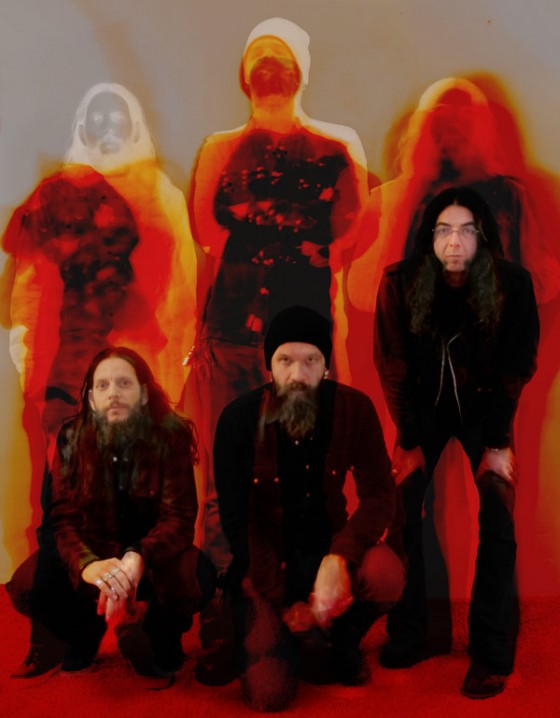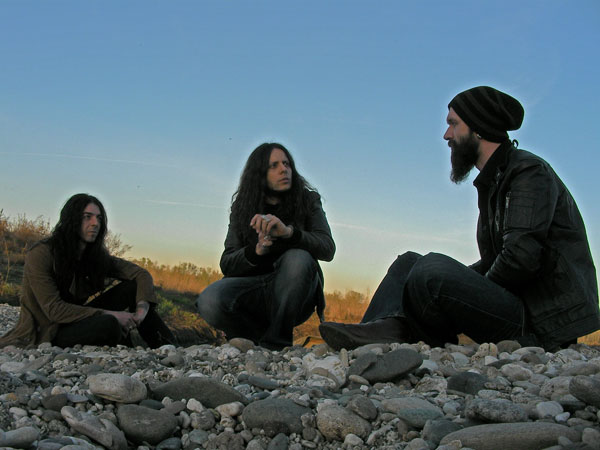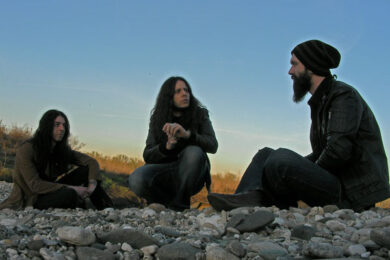When it comes to metal bands you could be forgiven for thinking that, despite its many other notable achievements, Italy has long been the poor relation of Europe and Scandinavia. Norway, Sweden, the UK; Mayhem, Meshuggah, Black-fucking-Sabbath – it’s hardly a fair contest is it?
Well set your faces to stunned, because according to the Encyclopaedia Metalum, which as some of you will know has insanely strict criteria for who is and who isn’t classed as ‘Metal’ (Soulfly, for example, are excluded, despite being a proper thrash band these days), Italy can claim to have spawned 4,777 ‘proper’ metal bands , compared to Sweden’s 3,392, the UK’s 3,247 and Norway’s unbelievably pitiful 1,279! Clearly there are issues of quantity over quality here, especially when you consider that included in that 4,777 is the laughable ‘The Muppets go Mötley Crüe horror-goth’ nonsense of Superhorrorfuck.
Of course this doesn’t mean every Italian metal band is terrible. Indeed, one particular band from Tortona, Northern Italy has been at the top of the list of the three or four most can name for some time now: UFOmammut. For well over a decade the trio have been warping minds with an unique style of oppressively doom-hued space rock that has been growing in both heaviness and scope since their formation. Two years ago they unleashed Eve, a single track epic, dedicated to the first woman on earth, that The Quietus described as "what Hawkwind playing Barrett era Pink Floyd (but with more riffs) sounds like in the head of a man that’s been kicked in the face by a horse." Now, having signed to Neurosis’ label, Neurot, they’re back with their most ambitious project to date: the two album ORO series.
Hello UFOmammut, your new album, ORO: Opus Primum is the first part of a pair of LPs both to be released this year. Why did you decide to go down the route of a double album package?
Urlo [bass/vocals]: Actually, for me personally, I’m not a big fan of double albums – like when there’s a double vinyl, even though the length is under an hour – but I especially don’t like when you’re presented with a double CD. I have some of them but I always end up listening more to one of the two parts; I’ve never liked albums that are too long. If I think about our previous albums, I probably fought to have them shorter; there’s always something too much about them.
So, back to ORO: as it’s a very long song (an hour and a half in its entirety), we thought it was a good idea to split it in two parts, to give each one time to assimilate with the listener. If we speak about music, I could say “shorter is better”, but of course, in other situations this is not good.
Poia [guitar]: It’s a different way of putting a lot of music on the player. We left some months between the two records, so when you’re bored with the first one it’s time to prepare yourself to be bored by the second one.
Vita [drums]: I still think it’s a good idea, but I’m afraid the next album could be a triple one!
Your previous album, Eve, had a very strong concept behind it. Is there a similarly strong concept behind the ORO albums? If so, what is that concept/story?
Urlo: ‘Oro’ is the Italian for Gold and the Latin for ‘I pray’. As well as that though, it’s the Hebrew ‘Or’ (light) when read from both sides (if you look at the cover art, you’ll see that the ‘R’ in ORO is doubled and it’s a sort of mammoth skull and a ‘pi’ symbol too). There are also a lot of magickal and alchemical things in the concept of this album – mainly we structured it around the idea of gold as representing knowledge and power, taken from nature by man to build his own “language”. But you can put any idea in it, because when I sing my voice is so processed you can’t tell what I’m saying and you can imagine whatever you want.
Poia: The structure of ORO reflects this concept: songs are full of layers, growing sounds and explosions or quiet moments. These elements are typical in UFOmammut, but in ORO they are more pronounced, more audible and taken to the limit. All these ups and down are like alembic movements, experimental tasks, mistakes or good decisions on the way to knowledge. This concept is very metaphorical, it being the main theme of all our lives.
With previous albums – Eve and Lucifer Songs for example – you’ve dealt with quite religious subjects. Is that an area you draw inspiration from? Or is it purely coincidental?
Poia: It’s not a coincidence. Religions and myths are like the walls of the place where all our fears and hopes lie. These myths were created by mankind simply in an attempt to understand our presence on Earth and they represent our deep culture in a willy-nilly sort of way. Our mission as human beings is not to destroy them, but to understand why these walls are still there, and try to open some doors on them. Knowledge is the key.
Urlo: I’m not into religion too much but I like the myths, so I prefer to think about Lucifer, Eve and so on as myths. They’re common to different religions, they’re more magic names representing different concepts of rebellion – nothing is bad and nothing is good, everything is relative in this world.
Vita: God and Satan do not exist; I believe God is music, the only real religion.
Musically too Opus Primum seems to have moved on from Eve – it feels a lot more droning and ‘tantric’ almost. The riffs are slower and more drawn out. What brought about this comparative change?
Urlo: I don’t know. It’s difficult for me to listen to what others feel about our music. I just take my bass and play and I guess it’s the same for Poia and Vita, we just let our minds go. We always try to do different things, we don’t want to be the prisoner of a riff or style. We try to make it and remake it. It’s a sort of evolution, let’s say. We like to create layers and layers, to grow around what we do, and with ORO I think it worked especially well. Of course it’s a totally different work from Eve but we’re very happy about it. When we started we were a little scared, Eve has been really important for us, we played it live for almost two years and it’s become a part of us so when we started thinking about a new album, the question was very simple, but tormenting: “And now what do we do…”
Poia: It’s the same for me. There is no plan in the beginning – the ‘evolution’ just starts. It’s like a sort of sculpting process, the thing is inside the marble, with its defined shape, but we don’t see it in its entirety until the end.
Vita: We are not real musicians so we play with our hearts, the music comes out from the inside and nothing is really planned. UFOmammut breathes and lives when we are all together and in gear, that’s probably the secret.
I read somewhere that you said your biggest musical influences were The Beatles and Pink Floyd, whilst in your records I hear a touch of Neurosis and Jerusalem-era Sleep too. So given the heaviness of UFOmammut, what else influences the sound of the band?
Urlo: I think Beatles and Pink Floyd are the most important bands ever. The Beatles explored every genre in music and Pink Floyd took music to another level of consciousness; they’re more than just inspiration, I think they’re more like ‘examples’ of how music exploration should conducted. But there are a lot of other bands that have influenced me. Apart from Sabbath I should say The God Machine, Motorpsycho, Sleep (although I’m not a big fan of Jerusalem), the first Kyuss LP, Melvins (another incredible example of musical exploration) and the Sex Pistols.
Poia: Speaking about Sleep, I suggest listening to their first album, Volume One, I think it’s an underrated masterpiece, and surely has influenced our music. Concerning me as a guitar player, I’ve been influenced by Sabbath, Zeppelin, Hendrix… But not too much in terms of style or presence in the song – I’m not that good – more in terms of their ‘dirty sound’.
Vita: Although we have many influences in common we all come from different musical backgrounds. Personally I’m more into heavy/ thrash metal like Motörhead (although I know they are not exactly heavy metal because Lemmy is the king of rock & roll), Slayer, early Metallica, Exodus; and hardcore bands from the 80s like The Dead Kennedys, D.R.I. or S.O.D. My drumming has been inspired by Nick Mason, Keith Moon, Mitch Mitchell and of course John “Bonzo” Bonham. But I’m not a drummer, I just make noise with a drum kit.
To that end, do you even consider UFOmammut a ‘metal’ band?
Urlo: Yes. I like to think we’re a metal band…
Vita: I consider UFOmammut a psych metal band but we also have some punk attitude in our music, especially on stage because each night we play our songs slightly differently to the night before.
Feature continues after photograph

Speaking of Neurosis, you’ve moved from your own label, Supernatural Cat, to their Neurot label for the new album. Why did you decide to make the change?
Vita: Before Supernatural Cat we had had many problems with labels because they talked about a lot of projects but in the end they disappeared like ghosts. [Neurosis guitarist] Steve [Von Till] is a musician so he knows what it means to make music and play on stage. It’s a collaboration between people loving music, without thinking of it just like a business.
Urlo: I don’t think it’s a change, we feel more like we’ve enlarged our family.
Poia: Joining Neurot is like seeing things from a new perspective. We co-operate at a different level with a label that has always been an inspiration and an example of independent attitude for us, but we also have the freedom of keeping the control over our work, like we’ve always done. This is the reason why we’ve chosen Neurot.
Once again the artwork for Opus Primum is stunning and complements the LP perfectly. In an age where more and more people get their music only through iTunes, why is album art work still important?
Urlo: Because we’re old guys and we grew up in a time where you spent a lot of time admiring the covers of the bands you loved. We’ve always taken care with our graphics, ever since the beginning. Music needs to have a clear imagery and personality. That’s why we care a lot about our covers and visuals… and amplifiers!
Poia: I believe that music has to be treated with respect. It is a ritual, it is something magick, something religious. Music needs icons for the imagination and devotion. I mean, real music. Not chewing gum music. But, as Urlo says, maybe we’re only nostalgic old guys.
Vita: A record is not only an object for me, but a thing to take care of and cuddle like a girlfriend. Poia is right, we are only old nostalgic guys.
It seems that metal and hard rock bands are often very closely tied to their artwork – you just have to look at Aaron Turner, Jacob Bannon, John Baizley etc – why do you think that is?
Urlo: Five guys out of millions of people playing is not so much! [laughs]. It’s difficult to explain, let’s say I think we’re lucky to have this skill and to be able to distil our music by creating a visual version of it. Metal and hard rock are the most vital musical genres. They contain a lot of subgenres, harness a lot of ideas and attract great minds who like experimenting, so it’s natural that there are people playing and drawing.
Poia: Or maybe, during these hard times of financial crisis, it’s better to have more work! [Laughs].
Urlo, are you still involved with your Farwest Zombee side project? For the uninitiated, can you tell us a little about it?
Urlo: Sure. The first work has been recorded, I just need to find the time to put my hands on it. With UFOmammut, Malleus and the label it’s quite difficult to focus on it, especially in this period. I hope we’ll have it out before the end of the world (so before December!). It’s a different thing I must say. Lorenzer and Fede of Lento, then Poia, Rose Kemp and Ste of ICO play on it, and the premix sounds very promising. It’s more repetitive, electronic and synth addicted; no vocals (apart from Rose Kemp’s) and heaviness everywhere. Just wait a little more and I’ll try to finalize it ok?
Finally, what state of mind should one be in to best enjoy ORO: Opus Primum?
Urlo: Just relax, we’ll do all the rest!
ORO: Opus Primum is out now on Neurot and is streaming in full now at the Roadburn 2012 website. They play The Garage, London with Incoming Cerebral Overdrive on April 24







